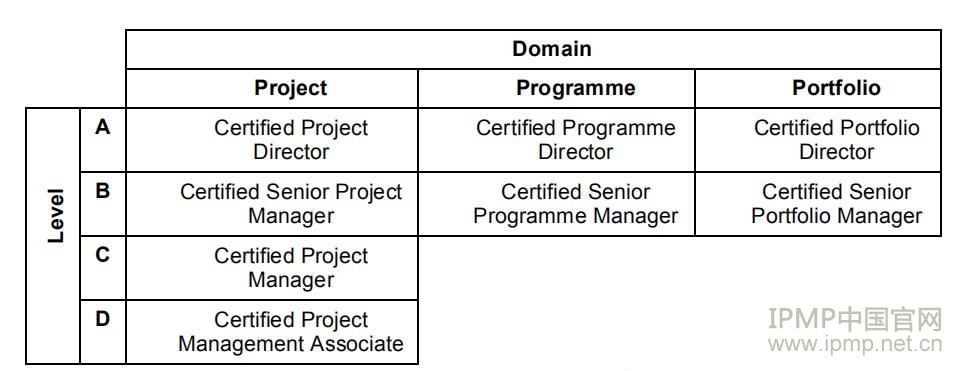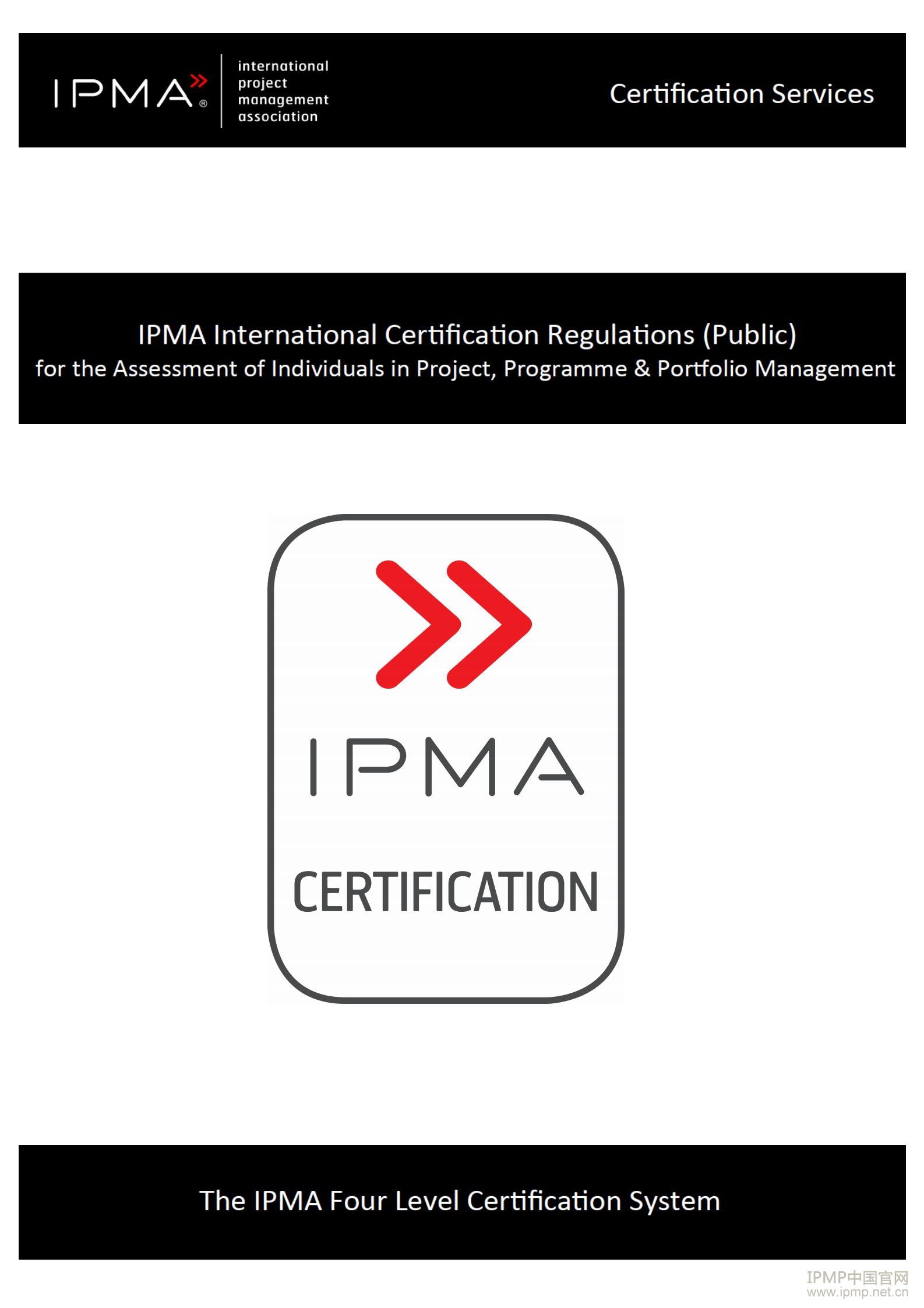The IPMA 4-L-C System operates with three domains: project, programme and portfolio management and four levels of competence:
There are four levels in the IPMA 4-L-C System – Levels A, B, C and D. The IPMA level definitions are constructed against the following core criteria:
• Level A is constructed in terms of the leadership of others in very complex projects (programmes or portfolios) throughout the life cycle (where applicable) at a strategic level.
• Level B is constructed in terms of the leadership of others in projects (programmes or portfolios) and includes complexity throughout the life cycle (where applicable).
• Level C is constructed in terms of the management of others in projects of moderate complexity throughout the life cycle through the application of knowledge/theory across all relevant competences.
• Level D is constructed in terms of knowledge across all relevant competences only.
There are three domains in the IPMA 4-L-C System – project, programme and portfolio. In the three domains, projects have four levels (A, B, C and D); programme and portfolio each have two levels (A and B). This creates eight profiles in the IPMA 4-L-C System as shown below:

IPMA profiles and eligibility criteria
IPMA Level D: Certified Project Management Associate.
An IPMA certification at Level D requires that the candidate has knowledge in the CEs related to project management. As such, they usually have broad project
management knowledge and may work in a project team.
Eligibility criteria: There is no previous experience required and only knowledgeCEs related to project management are assessed.
IPMA Level C: Certified Project Manager
An IPMA certification at Level C requires that the candidate has acted in a project management role within a moderately complex project environment within an
organisation.
Eligibility criteria: within the last six years the candidate needs to have a minimum of three years’ experience as a project manager within projects of moderate
complexity, or a minimum of three years’ experience in a responsible project management role assisting the project manager in complex projects. The evidence
timescale can be extended by four years to ten years with justification.
IPMA Level B: Certified Senior Project Manager
An IPMA certification at Level B for project management requires that the candidate has acted in a complex project environment within an organisation.
Eligibility criteria: within the last eight years the candidate needs to have a minimum of five years’ experience as a project manager of which at least three years
were in a responsible leadership function managing complex projects. The evidence timescale can be extended by four years to twelve years with justification.
IPMA Level B: Certified Senior Programme Manager
An IPMA certification at Level B for programme management requires that the candidate has acted in a complex programme environment within an organisation.
Eligibility criteria: within the last eight years the candidate needs to have a minimum of five years’ experience as a programme manager of which at least three
years were in a responsible leadership function managing complex programmes. The evidence timescale can be extended by four years to twelve years with justification.
IPMA Level B: Certified Senior Portfolio Manager
An IPMA certification at Level B for portfolio management requires that the candidate has acted in a complex portfolio environment within an organisation.
Eligibility criteria: within the last eight years the candidate needs to have a minimum of five years’ experience as a portfolio manager of which at least three
years were in a responsible leadership function managing complex portfolios. The evidence timescale can be extended by four years to twelve years with justification.
IPMA Level A: Certified Project Director
An IPMA certification at Level A for project management requires that the candidate has acted in a very complex project environment that has a strategic impact on the
organisation.
Eligibility criteria: within the last 12 years, the candidate needs to have a minimum of five years’ experience as a project manager in a responsible leadership function in
very complex projects of which at least three years were at a strategic level. The evidence timescale cannot be extended.
IPMA Level A: Certified Programme Director
An IPMA certification at Level A for programme management requires that the candidate has acted in a very complex programme environment that has a strategic
impact on the organisation.
Eligibility criteria: within the last 12 years, the candidate needs to have a minimum of five years’ experience as a programme manager in a responsible leadership
function in very complex programmes at a strategic level, or a minimum of four years’ experience as a programme manager in a responsible leadership function in very
complex programmes and a minimum of three years’ experience as a project manager in a responsible leadership function managing very complex projects at a
strategic level. The evidence timescale cannot be extended.
IPMA Level A: Certified Portfolio Director
An IPMA certification at Level A for portfolio management requires that the candidate has acted in a very complex portfolio environment that has a strategic impact on the
organisation.
Eligibility criteria: within the last 12 years, the candidate needs to have a minimum of five years’ experience as a portfolio manager in a responsible leadership function
in very complex portfolios at a strategic level or a minimum of four years of experience as a portfolio manager in a responsible leadership function in very
complex portfolios and a minimum of three years’ experience as a project or programme manager in a responsible leadership function managing very complex
projects or programmes at a strategic level. The evidence timescale cannot be extended.
How we define Complexity in Projects, Programmes and Portfolios
The more competent you are as a project, programme or portfolio professional, the more complex your responsibilities will probably become. Complexity is also of key value when you want to assess your current competence level. So, how do we see complexity of projects, programmes and portfolios?
We see ten factors that define complexity of initiatives (projects, programmes, portfolios). These ten are described below and are defined in the international certification regulations (ICR).
Complexity of Initiatives is defined through 10 Perspectives
Capability perspectives:
Input related complexity
Process related complexity
Output related complexity
Risk related complexity
Context perspectives:
Strategy related complexity
Organisation related complexity
Socio-cultural related complexity
Management/Leadership perspectives:
Team-related complexity
Innovation-related complexity
Autonomy-related complexity
A Global Certification
The IPMA certification is recognised worldwide. Over the last 10 years IPMA has certified more than 300 000 project managers in over 70 countries across the
globe. Global corporations benefit from IPMA’s international presence and recognition. We enable them to use the same certification for the entire company in all countries.
The examination process has no language barriers. Candidates always have the choice of doing the certification in their own language or in English. No matter where you live or what language you speak, you are always welcome to certify your competence with IPMA.
In addition to the uniqueness of the IPMA certification system, as shown below, our certificants represent an appropriate balance of business sectors, as opposed to focusing upon or being dominated by just one or two. This variety includes these business sectors:
• Construction Industry
• Pharmaceuticals
• Automobile
• Oil and Gas
• Utilities
• New Energy
• Banking and Insurance
• Consultancy and Training
• Logistics and Transportation
• Aerospace and Defense
• Government Agencies
• IT and Telecommunications
ICR4 Public
This document has been developed with the objective of summarising the key features within the International Project Management Association International Certification Regulations (IPMA ICR) Version 4.0 approved by the IPMA Council of Delegates during its 50th anniversary in Panama on 27th September 2015. It is known as IPMA ICR Version 4.0 (Public).
for free download click here:ICR4 Public

IPMA-Code-of-Ethics-and-Professional-Conduct
for free download click here:IPMA-Code-of-Ethics-and-Professional-Conduct

